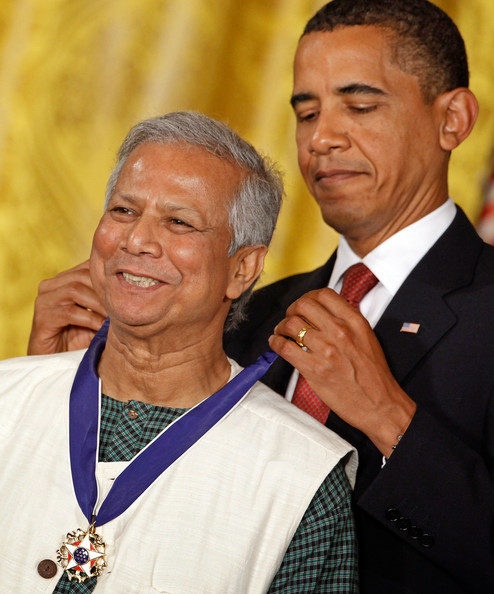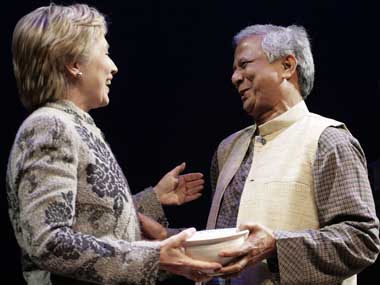by rahnuma ahmed
I HAVE recently returned from Jhalokathi. I had gone there as part of a citizens’ group to lend support to seventeen year old Limon Hossain, shot and maimed by a RAB bullet. It was a case of mistaken identity but this simple truth is denied by the government, by the ruling party’s top-ranking leaders and high-ranking police and RAB officials, who viciously keep insisting that Limon is a ‘terrorist.’ All because the government’s elite anti-crime, anti-terror force, can do no wrong. Never, ever. A state of affairs that we, as citizens, contest.
After returning to Dhaka, I flipped through news reports of our visit. Many had characterised our group as being, one of ’eminent’ citizens. Very elitist. Others, of being composed of ‘human rights leaders and activists’, implying a total disregard for its political and ideological diversity since the group consisted of members, including I myself, keenly aware of the politics of human rights. Of, for instance, Nobel Peace Prize recipient Dr Yunus’ notion of credit as being a fundamental human right. Its absurdity, sharply pointed out by anthropologist Lamia Karim who asks, if credit is replaced with the word debt, how can debt, ?a relationship of power and inequality between the loan institution and the borrower? — be construed as a human right?
But worse still, possibly, was one news report which labelled us as shusheel shomaj i.e., civil society (‘Gota jati Limoner pashe. Rajapurey shusheel shomaj,’ Samakal, August 31, 2012). Over the last two decades, the ‘civil society’ in Bangladesh has largely been re-created through donor-funding; it is rooted in the development industry; the corporate-owned media reproduces the category almost mindlessly. The shusheel shomaj of now — of these neo-liberal, rolling-back-the-state times — stands on the ruins of associations and bodies of a previous era, when they had been organic, when ties and solidarities had been forged unmediated by western donor funding.
I’d thought of writing about my experience in Jhalokathi, for this week’s column. But I changed my plans since the government’s persecution of Dr Yunus rages unrelentingly.
If I hadn’t, changed plans that is, I’d have written about how the Justice for Limon campaign appears to have entered a new phase. About Limon’s mother Henoara Begum’s courage and dignity, which was a humbling experience for many. I’d have written about why I think Dhaka’s journalists, particularly, the elected, national-level leaders of the journalist community, need to go to Jhalokathi post-haste. To take lessons from local-level journalists on how to set aside ideological and political differences in order to collectively struggle for a common cause. It’d help them put their act together, I thought, while we drove back to Dhaka. To work out effective strategies for pressurising the government to find the killers of Sagar and Runi, a journalist couple, brutally murdered in the early hours of February 11, 2012.
But maybe, expecting ‘national’-level leaders to learn from ‘local’ journalists is expecting too much. Surrendering inflated egos and entrenched partisanship along political party lines is too tall an order, even if it means we may never know why their colleagues had to die. ‘Local’ and ‘national’ — by surface appearances merely geographical — are categories ridden with power. Who commands the authority to speak for others, and on what basis, is made invisible. As another anthropologist, the much-renowned Talal Asad, points out, taken literally, all of us are local most of the time, in the sense of being locatable. But not everyone has the same opportunity for movement, or the same practical reach.

The persecution of Dr Yunus rages as ruling party leaders continue to hurl abusive remarks at him publicly, as the government initiates vindictive investigations into his alleged financial corruption. Even the blind can tell that the president’s promulgation of the Grameen Bank (Amendment) Ordinance 2012 on August 23, 2012, has been deliberately crafted to wrest away the power and authority of women borrowers (97% owners) to appoint the Bank’s MD — contrary to the rule still followed in the case of all private sector banks (New Age editorial, August 25, 2012).
Does the ruling party leadership think that the Yunus witch-hunt will help deflect public attention away from the Padma bridge fiasco, which, rumors have it, implicate family members of the prime minister? That, long-seething public anger at the deplorable state of affairs — a near-collapse of the law and order situation, the third electricity price hike this year coming ahead to be backdated from September 1, high prices of everyday consumer items, traffic-related deaths and injuries, to mention just a few — will dissolve? That, our alarm at the marked increase in sexual violence toward jumma women and girls will dissipate? If so, then ruling party leaders are obviously living in a dream world.

- U.S. Senators Hillary Rodham Clinton (L) (D-NY) and Kay Bailey Hutchison (R) (R-TX) present a global trailblazer award to Muhammad Yunus of Bangladesh, winner of the 2006 Nobel Peace Prize, during the Vital Voices annual award ceremony at the Kennedy Center in Washington March 14, 2007. U.S. nonprofit organisation Vital Voices honors global women leaders for expanding democracy, promoting legal reforms and human rights. REUTERS/Yuri Gripas (UNITED STATES)
Dr Yunus himself didn’t help matters much by choosing racist words to describe what the Amendment meant for him, ?The day will remain branded as a black day in the nation?s history? (emphasis added; pointed out in the New Age editorial). Nor, by seeming to signal that the Awami League might not return to power (elections are a bit more than a year away). ?I hope, there?ll come a government in the future, the first job of which will be to revive the glory of this bank by returning the bank to its poor women owners holding a function at the national level. And the people of this country will heave a sigh of relief on that day?? (The Daily Star, August 24, 2012). The BNP quickly cashed in on the crisis by urging the government to repeal the amended ordinance, by Moudud Ahmed, a standing committee member — and one of the chief architects of RAB — declaring, ?People want to get rid of this regime?they don?t want to see [the] Awami League in power anymore.?
Dr Yunus’ hopes and Moudud Ahmed’s dreams are echoed in the recent assessment of the Indian intelligence establishment. According to The Times of India, the increasing unpopularity of the Awami League government suggests ?the possibility of a regime change in Dhaka in early 2014? (August 29, 2012).
Politically opportunistic defences of the Awami League government’s takeover of the Bank, are ceaselessly provided by a large array of the ruling party’s service-bound ’eminent’ citizens, even those who hold official positions in public institutions. When Nurul Kabir, editor, New Age, was recently asked in a TV talk show to comment on a press statement which criticised Dr Yunus for creating pressure through “exploiting his personal relations” with a “super power and donor agencies” — signatories to which included current vice-chancellors of Dhaka, Jahangirnagar, and Bangabandhu Sheikh Mujib Medical universities, a former vice-chancellor, present heads of Bangla Academy, Bangladesh Shilpakala Academy, artists, economists, novelists, poets, theatre directors etc., — he retorted, well, I don’t see any of them signing statements protesting against the state’s persecution of Limon. Nor, demanding an end to the immunity provided by the government to RAB. Nor, I would like to add, about the presence of US Special Forces in the country, of which we learnt, not from our government, but though news reports of a US Congressional hearing.
And when the ruling party’s leaders, from the prime minister down to party activists, howl shood, shoodkhor (usury, usurer), it betrays, as Kabir has repeatedly stressed, not a principled position against financial exploitation, let alone against capitalism, a system which exploits and impoverishes the vast majority. Which, in its latest stage, has consolidated power and resources, most frighteningly so, in the 1%. I myself would like to point out another of the government’s incongruencies which further exposes its actions as being personally motivated. When the Review Committee set up by the government claims that Grameen Bank is a “government bank,” when the finance minister says, ?Grameen Bank is a government institution. The government has created it and brought it thus far. It is because of the government that Mr. Yunus could come this far?– what else can it imply but that the government is the primary usurer? The bloodsucker?
The current framing of the controversy — Are you for or against Dr Yunus? — has markedly Bush-ian overtones, “you are either with us or against us.” It prevents enlarging the terms of the debate, which, in my opinion, is absolutely necessary. For political reasons, for moral reasons.
Dr Yunus undoubtedly has powerful supporters. The most powerful, for he enjoys the support of the Obama administration; the US secretary of state Hillary Clinton, during her visit to Bangladesh this May (not pre-scheduled, she had possibly come because of Yunus?), had said, ?I don?t want anything that would in any way undermine what has been a tremendous model.?
Having such supporters is a serious liability. I fail to understand why this has not occurred to Dr Yunus, or, to those who, by defending him, fall into the same camp by default, one which has been exposed the world over for war-mongering, for invading and occupying, for bringing death and destruction, for using depleted uranium (a war crime), for shattering the lives and dreams of untold millions. Men, women, children, elderly. Civilians. Drone-attacked by the US administration, because the latter has the power to kill, to label those killed to be “terrorists.” Just like RAB, but more frighteningly so, for RAB — and the government which provides it impunity — is puny compared to the might of the military-industrial-intelligence complex which increasingly expands, to the point of threatening to devour the last semblance of peace in the world.
There is no longer any reason to be taken in by president Obama’s Nobel Peace Prize, not after he has earned the credit of having expanded the war, of ordering the assassination of American citizens through drone attacks (extra-judicial killings, which is precisely what we insist, RAB cannot, should not enjoy), of dressing up regime changes in third world countries as humanitarian interventions.
Unless one believes, as the acclaimed Indian writer Arundhati Roy had acerbically commented in 2001, that bombing Afghanistan will bring peace. It can, only if one also believes that, “Pigs are horses. Girls are boys. War is peace.”
Or, as a feminist anti-war poster states, “Bombing for peace is like **cking for virginity.”
———
Published in New Age, Monday, September 2, 2012
Related links on Grameen and Yunus:
An attack on Grameen Bank and the cause of women
‘Yes’, ‘Wow’ youth adda with Hillary Clinton
Part V Military-installed caretaker govt, or a ?consortium? govt?
Beating the enemies of microfinance
Related links on RAB persecution of Limon Hossain
Cowardice Unlimited
The government’s Eid gift for Limon
RAB blame Limon
RAB victim Limon attacked again
